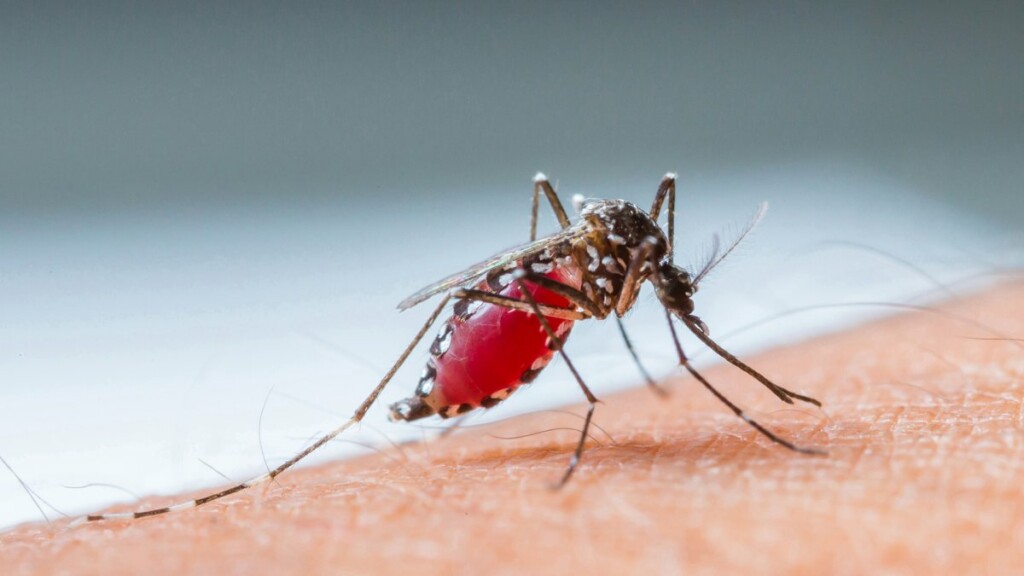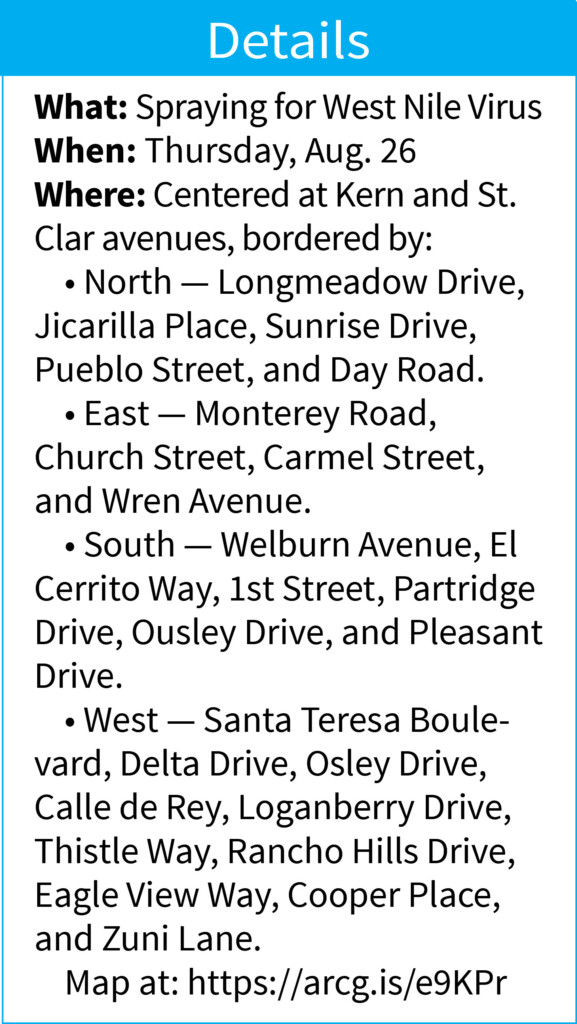Health: County sprays portions of Gilroy for West Nile Virus mosquitoes
Spraying in targeted areas occurred Aug. 26
![]()

By Staff Reports
The County of Santa Clara Vector Control District took steps last month to keep South Valley residents safe from a dangerous disease.
 Technicians confirmed West Nile virus positive tests in adult mosquitoes collected from in Gilroy and the surrounding area. As a result, a truck-mounted adult mosquito control treatment took place in the area to prevent human cases of WNV.
Technicians confirmed West Nile virus positive tests in adult mosquitoes collected from in Gilroy and the surrounding area. As a result, a truck-mounted adult mosquito control treatment took place in the area to prevent human cases of WNV.
The spraying took place Aug. 26, over a few hours. The district adhered to all recommendations from the Centers for Diseases Control and the county’s Public Health Department regarding COVID-19 and conducted the treatment under safety guidelines.
Door hangers notifying the public of the scheduled mosquito treatment were placed in neighborhoods beginning Tuesday, Aug. 24.
Notice was also sent directly to the public in the treatment zip codes through AlertSCC, and to those who subscribe to Nextdoor neighborhood networks. General notice was also provided on various social media platforms, including Mailchimp email notification, Facebook, Instagram, and Twitter (@SCCVCD).
During the adult mosquito control treatment operations, there is no need to relocate. Those who wish to minimize exposure for family members or pets may close windows and remain inside during the scheduled time period, which typically lasts three hours. All control treatments utilized are approved by the Federal and State Environmental Protection Agencies and are widely used by Vector Control agencies throughout California.
Health Effects of West Nile Virus
Since the arrival of West Nile virus to California in 2003, 7,360 people across the state have contracted the disease; 339 of those cases were fatal. In 2020, there was one human WNV-related fatality; 2015 was a record year for fatalities in the state with 55 deaths.
 WNV infection does not cause symptoms in most people; however, for some individuals it can cause fever, headache, body aches and, in severe cases, significant neurological damage or death. Adults older than 50 and individuals with certain chronic medical conditions such as diabetes, high blood pressure, cancer, and kidney disease are most at risk for serious complications.
WNV infection does not cause symptoms in most people; however, for some individuals it can cause fever, headache, body aches and, in severe cases, significant neurological damage or death. Adults older than 50 and individuals with certain chronic medical conditions such as diabetes, high blood pressure, cancer, and kidney disease are most at risk for serious complications.
The public can play an important role in preventing the spread of West Nile virus. The following are some key prevention measures.
On Property:
- Drain or dump standing water weekly. Mosquitoes lay eggs in stagnant water.
- Drain, remove or turn over anything that can hold water, such as flowerpots, planter bases, bird baths, toys, cans, rain gutters, pet dishes, buckets, and old tires. Fix leaky water faucets and sprinklers.
- Screens on doors and windows should be tight-fitting and in good condition.
- Do not let your swimming pool water fall below the pump circulation area. Free mosquitofish placement can be requested online at www.sccvector.org for placement in neglected pools or ornamental ponds.
Outdoor Activities:
- Limit outdoor activities during dusk and dawn to prevent mosquito bites. Those are the times when the mosquitoes that transmit WNV are most active.
- If you need to go outside in an area where mosquitoes are active:
- Dress in long sleeve shirts and long pants, preferably in light colors.
- Apply insect repellent approved by the Environmental Protection Agency, following label instructions.
Contact the County of Santa Clara Vector Control District if you are being bothered by mosquitoes or know of a potential mosquito-breeding source.
For free assistance with mosquito control, WNV, or other vectors, residents can contact the district office at (408) 918-4770 or fill out a service request online at SCCVector.org.
- Results of March 5 primary election show nearly 23 percent SCC voters turn - March 9, 2024
- Mushroom Fest coming back Memorial Day weekend - February 9, 2024
- Garlic Festival seeking sponsorships - February 9, 2024

